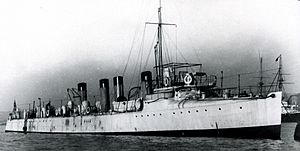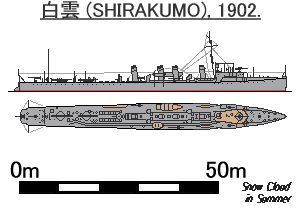Japanese destroyer Shirakumo (1901) facts for kids

Shirakumo upon commissioning in England in 1902.
|
|
Quick facts for kids History |
|
|---|---|
| Name | Shirakumo |
| Namesake | 白雲 ("White Cloud") |
| Ordered | 1900 |
| Builder | John I. Thornycroft & Company, Chiswick, England |
| Yard number | Destroyer No. 15 |
| Laid down | 1 February 1901 |
| Launched | 1 October 1901 |
| Completed | 13 February 1902 |
| Commissioned | 13 February 1902 |
| Reclassified |
|
| Stricken | 1 April 1923 |
| Fate | Sunk as target 21 July 1925 |
| General characteristics | |
| Type | Destroyer |
| Displacement | 322 tons normal, 432 tons full load |
| Length |
|
| Beam | 20 ft 9 in (6.32 m) |
| Draught | 8 ft 3 in (2.51 m) |
| Depth | 13 ft 9 in (4.19 m) |
| Propulsion | 2-shaft reciprocating engines, 4 boilers, engine output 7,000 hp (5,200 kW) |
| Speed | 31 knots (57 km/h; 36 mph) |
| Complement | 62 |
| Armament |
|
| Service record | |
| Operations: |
|
The Shirakumo (meaning "White Cloud" in Japanese) was a type of warship called a destroyer. It was built for the Imperial Japanese Navy in the early 1900s. It was the first ship of its kind, leading a class of two destroyers.
Shirakumo played an important role in two major wars. During the Russo-Japanese War (1904–1905), it fought in battles like the Battle of Port Arthur, the Battle of the Yellow Sea, and the Battle of Tsushima. Later, in World War I (1914–1918), it took part in the Battle of Tsingtao.
Contents
Shirakumo was ordered as part of a naval plan in 1900. Its construction began on 1 February 1901 in England. It was built by a company called John I. Thornycroft & Company in Chiswick.
At first, it was known as Destroyer No. 15. On 1 October 1901, the ship was officially launched and given its name, Shirakumo. It was finished and officially joined the Japanese Navy on 13 February 1902.
Shirakumo at Sea
Shirakumo left England on 27 February 1902 to sail all the way to Japan. It arrived safely in Kure on 30 May 1902.
Fighting in the Russo-Japanese War
When the Russo-Japanese War began on 8 February 1904, Shirakumo was part of the 1st Destroyer Division. The war started with a surprise attack by Japan on Russian warships at Port Arthur, China.
Ten Japanese destroyers, including Shirakumo, launched torpedoes at the Russian ships. They got very close, about 650 yards away. One torpedo from a sister ship, Kasumi, hit a Russian cruiser named Pallada.
Shirakumo continued to fight in the war. It was part of the Battle of the Yellow Sea on 10 August 1904. Later, it joined the 4th Destroyer Division and fought in the famous Battle of Tsushima on 27–28 May 1905.
During the Battle of Tsushima, Shirakumo and other destroyers attacked a damaged Russian battleship, Knyaz Suvorov. While other ships fired their torpedoes, Shirakumo found that the Russian battleship had already stopped moving. Knyaz Suvorov later sank.
Later Years and World War I
On 28 August 1912, Shirakumo was reclassified as a "third-class destroyer." This meant it was considered an older, less powerful type of destroyer.
When Japan entered World War I in August 1914, Shirakumo was still active. It took part in the Battle of Tsingtao in 1914.
After World War I, Shirakumo was given new roles. On 1 April 1922, it became a "special-duty vessel" and was used as a second-class minesweeper. A year later, on 1 April 1923, it was removed from the official navy list. It was then used as a utility vessel, like a floating accommodation ship where sailors could live.
Shirakumo was eventually used for target practice. On 21 July 1925, it was sunk as a target in the Bungo Channel near Himeshima.
Images for kids




